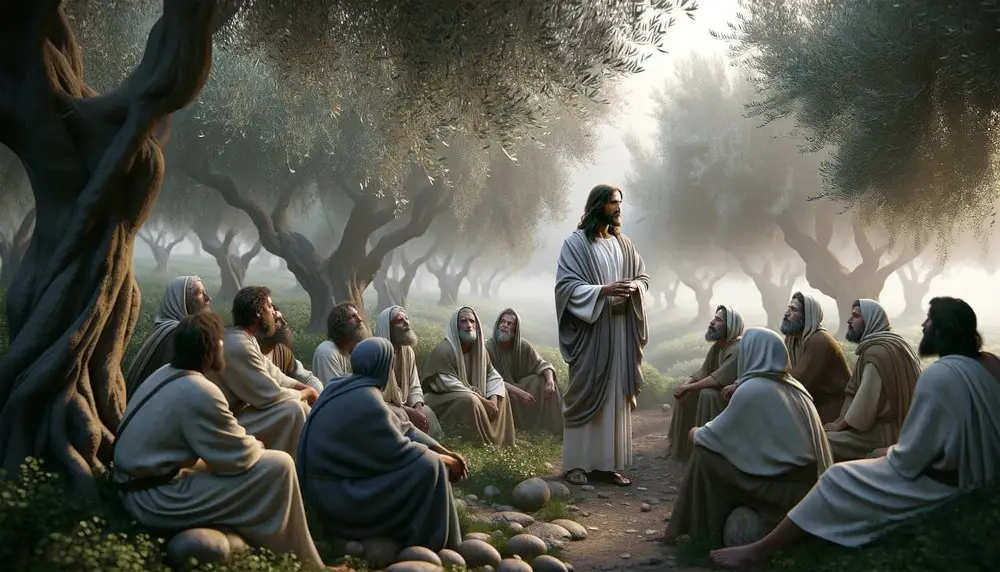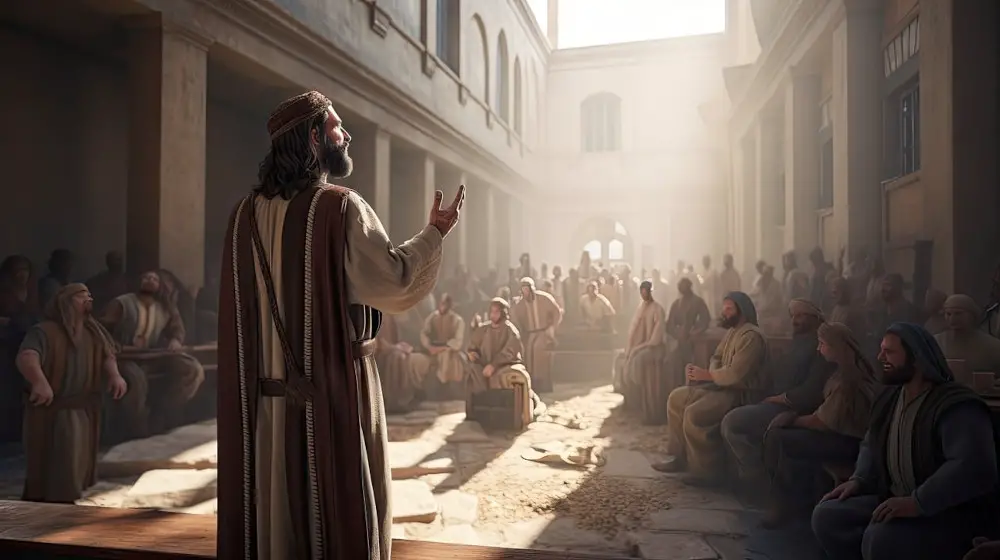Irene grew up in a small farm town where people lived modestly within their means. Most people attended services at their little white steepled church on the main street.
There, she often heard fiery sermons booming from the pulpit about tithing 10% of your income. She took those words to heart, faithfully giving a portion back to God.
Later when she and John married and moved to the city, money flowed more freely yet felt more scarce in the face of ever creeping costs. Though they contributed to charities when possible, she admits that having nice things sometimes took priority over giving.
After John lost his job last fall, they struggled to pay the bills. One sleepless night while fretting over finances, she opened her late grandmother’s old leather Bible.
There she rediscovered the meaning of biblical stewardship. Passages revealed it was far more than just tithing a fixed percent or avoiding debt.
It was accepting God’s gifts and then using all resources at your disposal responsibly to care for others and further His kingdom. As that truth took root in her soul, their outlook and direction changed.
Join me as I explore the biblical foundations of stewardship – what it meant to ancient peoples, how Jesus expanded its meaning, and what is required of Christians today.
Get ready to gain a whole new perspective on building God’s kingdom through wise resource management!
What is Biblical Stewardship?

Let’s start at the beginning…
In the Book of Genesis, we read about how God created the heavens and the earth. On the 5th day:
“God created the great sea monsters and every living creature that moves, of every kind, with which the waters swarm, and every winged bird of every kind. And God saw that it was good.”
Genesis 1:21 (AMP)
biblegateway.com
After making the creatures of the sea and sky, God then said:
“Let the earth bring forth living creatures of every kind: cattle and creeping things and wild animals of the earth of every kind.” And it was so.
Genesis 1:24 (NRSVA)
biblegateway.com
God not only created all living creatures, but he blessed them saying:
“Be fruitful and multiply and fill the waters in the seas, and let birds multiply on the earth.”
Genesis 1:22 (NRSVA)
biblegateway.com
Here we see God entrusting these creatures with the responsibility to be fruitful and multiply on the earth.
Next, God created man and woman in his own image. To them, he gave the same blessing but with a greater responsibility:
“Be fruitful and multiply and fill the earth and subdue it, and have dominion over the fish of the sea and over the birds of the heavens and over every living thing that moves on the earth.”
Genesis 1:28 (ESV)
biblegateway.com
This mandate to “have dominion” is where we first see the concept of stewardship.
God entrusted mankind to manage, care for, and properly govern all the resources on earth.
We were given dominion over the fish, the birds, and every living thing. We are called to:
- Be fruitful (use resources wisely for increase).
- Multiply (expand proper management to more people).
- Subdue (responsibly harness resources).
- Have dominion (guide, lead, govern).
In other words, God created humans not just to consume freely, but to responsibly oversee and steward the resources on the planet.
We are accountable to him for how we exercise dominion over the earth and its creatures. This is the essence of biblical stewardship.
Stewardship in the Old Testament

Now let’s see how the concept of stewardship progressed in the Old Testament.
In the Book of Exodus, Moses led God’s people out of slavery in Egypt to the promised land.
The Israelites were completely dependent on God for deliverance, protection, and provision.
At the Red Sea crossing, he parted the waters so they could walk through on dry land:
“And the people of Israel went into the midst of the sea on dry ground, the waters being a wall to them on their right hand and on their left.”
Exodus 14:22 (ESV)
biblegateway.com
What a powerful demonstration of God’s complete dominion over creation!
Later, when the Israelites were hungry in the wilderness, God again provided miraculously:
Then the Lord said to Moses, “Behold, I am about to rain bread from heaven for you, and the people shall go out and gather a day’s portion every day, that I may test them, whether they will walk in my law or not.”
Exodus 16:4 (ESV)
biblegateway.com
And for 40 years, God faithfully delivered manna from heaven to feed the entire nation. What an incredible display of God’s provision and care for his people!
Through these events, the Israelites saw firsthand how God can provide abundantly. And their role was simply to gather and steward only what they needed for each day.
We also see principles of stewardship in:
- Laws on gleaning: Leaving portions of harvest for the poor (Leviticus 19:9-10).
- Year of Jubilee: Returning property to original owners and freeing slaves (Leviticus 25:10).
- Tithes and offerings: Giving 10% back to God; supporting priests (Leviticus 27:30-32).
These regulations encouraged sharing resources, canceling debts, and prioritizing worship with first fruits giving.
Generosity and care for the vulnerable were built into the economic system.
The Israelites were to remember that the land, animals, crops, and riches all came from and belonged to God. They were simply managers of the resources entrusted to them.
Parables on Stewardship in The Bible – The Talents

Now let’s see how Jesus expanded the concept of stewardship in his teaching and parables.
One powerful example is the Parable of the Talents in Matthew 25:14-30.
A wealthy man goes on a journey and entrusts three servants with bags of gold coins (talents). To one he gives five talents, to another two talents, and a third gets one talent, dividing them “according to their abilities.”
The servants with five and two talents invested them and doubled their money. But the servant given one talent buried it in the ground and didn’t earn any return.
The master returns from his trip and is pleased with the servants who invested wisely. But he calls the servant who buried his money “wicked and slothful” and has that one talent taken away and given to the top producer.
The key truth? The servants were entrusted with resources (talents) according to their ability level. But they were all expected to actively manage those resources for increase, not just preserve them.
The master sought a return on his investment. The “good and faithful” stewards multiplied what they were given. They had the proper mindset and handled their master’s resources wisely.
But the wicked servant didn’t do his job. By burying the money, he failed as a steward. So the master took back even what little he had failed to manage properly.
Each servant in the parable was a steward. The two good stewards embraced that role and were rewarded. The bad steward did not and was penalized severely.
This parable powerfully echoes man’s original purpose from Genesis.
God has entrusted us with resources and abilities. He expects us to manage them responsibly for increase, not just preservation.
We are stewards whether we embrace the role fully or not.
Stewards of God’s Grace

Building on the foundation of Genesis and the Gospels, Peter and Paul further developed the concept of stewardship:
Peter wrote to persecuted Christians:
“As each has received a gift, use it to serve one another, as good stewards of God’s varied grace.”
1 Peter 4:10 (ESV)
biblegateway.com
Paul charged Timothy to help develop leaders and teach sound doctrine as a “good servant of Christ Jesus, being trained in the words of the faith.” (1 Timothy 4:6)
Paul later described his calling this way:
“I became a minister according to the stewardship from God that was given to me for you, to make the word of God fully known.”
Colossians 1:25 (ESV)
biblegateway.com
For Peter and Paul, proper stewardship meant faithful service empowered by God’s grace. Their stewardship was focused on the gospel mission – making disciples and teaching God’s word.
Paul wrote this to the Corinthians about how church leaders should view their roles as stewards:
“1 This is how one should regard us, as servants of Christ and stewards of the mysteries of God. 2 Moreover, it is required of stewards that they be found faithful.”
1 Corinthians 4:1-2 (ESV)
biblegateway.com
Faithfulness was key. The apostles embraced their identities as servants and stewards. Their chief aim was to fulfill their calling, not seek personal glory or wealth.
Paul’s letters reveal core principles like:
- Our lives and abilities are a gift from God to be stewarded.
- We manage resources God has entrusted to us.
- Stewards have a responsibility to fulfill their master’s will.
- Faithfulness matters more than success in God’s eyes.
Stewardship in Action Today

So what does living out biblical stewardship look like today?
It comes down to embracing our role as stewards and managing everything in our lives – from money and time to talents and relationships – for God’s purposes and glory.
Here are 3 key ways to live as a faithful steward:
1. Steward your finances, time, and talents wisely
Use your income, time, skills, and resources in strategic alignment with biblical values.
Be generous, reject wastefulness, and constantly seek God’s direction for how to steward your blessings.
Practically, this includes things like:
- Tithing and giving generously.
- Limiting excess and debt.
- Volunteering your time and talents.
- Maximizing your strengths, passions, and calling.
Live purposefully. View all you have as God’s possessions on loan to you for a time. Invest them wisely into eternal rewards.
2. Steward the earth and environment responsibly
Our dominion mandate from Genesis 1:28 still applies today. God entrusted humans with caring for the earth.
Are we protecting the environment and resources? Or abusing the planet for selfish gain?
Ask God to show you how to be a faithful steward of the earth. Your sphere of influence might seem small, but collectively our choices make a big impact.
- Conserve energy.
- Reduce waste.
- Care for natural resources.
- Limit pollution.
Little steps add up when we embrace our role as stewards of God’s creation.
3. Steward your relationships lovingly
Your time, attention, and resources can bless others and point them to Christ. But you also have a stewardship responsibility in all your relationships.
Protect the trust placed in you by others. Cultivate healthy patterns of open communication and forgiveness. Major in the majors – keep first things first.
Ask God for wisdom to steward relationships for growth. Be intentional yet selfless with your limited time and energy. Invest in your spouse, children, family, friends, and the church community.
Build people up with wisdom and love. Your stewardship impacts lives now and for eternity.
Key Takeaways on Biblical Stewardship
Stewardship in the Bible is…
- Rooted in God’s act of entrusting us with managing the resources He owns.
- Accepting responsibility to oversee and govern/lead.
- Using all God gives us for increase and His purposes.
- Living strategically and generously as stewards.
- Being ready to give an account of how we managed what has been entrusted to us.
God created humans for the role of steward. Are you embracing it fully?
View life through the lens of a steward and it powerfully reframes everything. You are simply managing resources that belong to God.
Fulfill your calling faithfully. God sees and will reward your obedience, even if no one else does. Keep eternal priorities dominant.
Start Living as a Biblical Steward
Are you ready to embrace your true calling as a steward?
God created humans for this purpose. But many Christians never see it or live it out. As a result, our resources remain entirely self-directed.
But what could change if you grasped your role as a steward? How would it transform your perspective on time, talents, relationships, and finances?
Begin by praying through everything you’ve been entrusted with. Ask God to realign how you view your resources. Commit to stewarding it all for eternal reward.
When you live daily as a faithful steward, your impact will expand exponentially. Other lives will be touched and God’s kingdom will benefit for generations to come.
You were designed to thrive as a steward. It’s your true calling and highest purpose. Embrace it fully, and experience the blessings!
Frequently Asked Questions on Stewardship
Q. Should I tithe on my gross or net income?
A. The biblical tithe was calculated on total produce/animals/resources, equivalent to our modern gross income.
Yes, calculating the tithe on net income is easier. But the tithe principle is giving back 10% of our “first fruits” – the gross amount.
Q. Is tithing required for Christians, or just encouraged?
A. Tithing appeared before the Law of Moses. Abraham and Jacob both tithed earlier in Israel’s history. Jesus reaffirmed the tithe (Matthew 23:23).
Yes, tithing is required for Christians today.
Q. Aren’t generous giving and tithing just “prosperity gospel”?
A. No – the motivation makes all the difference. The ‘prosperity gospel’ claims that we earn God’s blessing and wealth by giving.
The biblical motivation for tithing and generosity is gratitude and a desire to honor God by building His kingdom.
Q. Isn’t generosity risky? What if I don’t have enough left?
A. Yes, it involves faith in God’s provision! But in every instance in Scripture, God blessed and increased generous givers who trusted Him.
When in doubt, apply the 80/10/10 principle: Give 10%, save 10%, and live on the remaining 80%.






